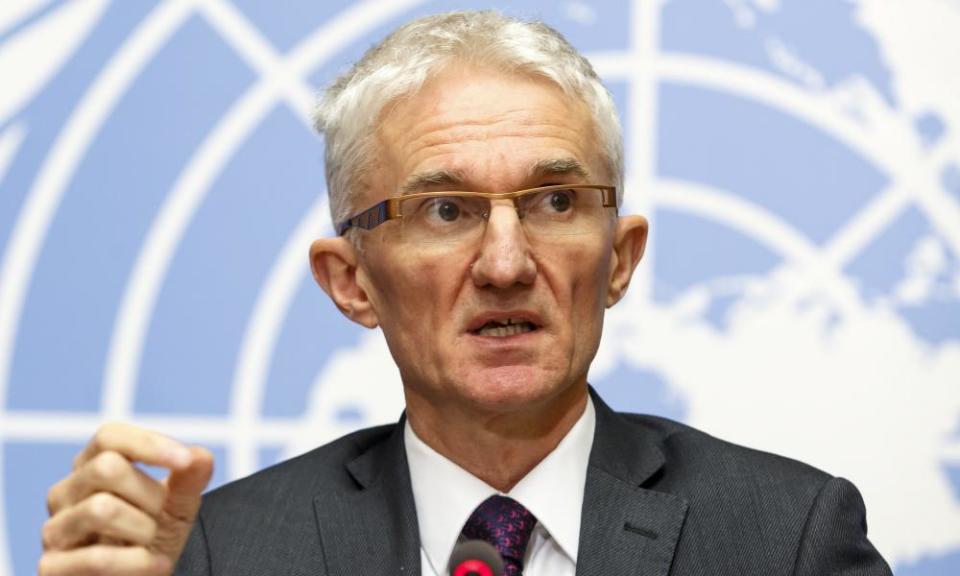Humanitarian system is failing people in crisis, says UN aid chief

The world’s multibillion-dollar humanitarian system is struggling because unaccountable aid agencies are not listening to what people say they need and instead are deciding for them, the UN’s humanitarian agency head will say this week.
In a startling analysis of the programme he oversees, Mark Lowcock, the coordinator of the UN’s aid relief operation since 2017, will say he has reached the view that “one of the biggest failings” of the system is that agencies “do not pay enough attention” to the voices of people caught up in crises.
“The humanitarian system is set up to give people in need what international agencies and donors think is best, and what we have to offer, rather than giving people what they themselves say they most need.”
A former British civil servant, Lowcock will deliver his remarks to the Washington-based Center for Global Development thinktank on Thursday.
In the speech, seen by the Guardian, he will call for increased funding for vital UN services that are overstretched and argue that millions of people are still being helped despite the severe funding shortages.
However, he will also call for the appointment of an independent commission to make aid agencies accountable. The commission would be tasked with listening to people in crisis and grading the quality of agencies’ work.
At present, he will say, the stated needs of those requiring help is not sufficiently part of the discussion of humanitarian agencies with the result that bothh people do not get enough of the help they say they want and the money could be more efficiently used. The UN this year hopes to raise $35bn (£25bn).
“In Chad and Cox’s Bazar [in Bangladesh] and other places too, people in dire humanitarian need are frequently selling aid they have been given, to buy something else they want more – a clear indication that what is being provided does not meet people’s needs and preferences.
“After the central Sulawesi earthquake in 2018, almost half of displaced households reported shelter as one of their most important and immediate priorities. Yet only a small fraction of people got immediate help with that.
“Unfortunately, these are not isolated examples. Last year, more than half the people surveyed in Burkina Faso, the Central African Republic, Chad, Nigeria, Somalia and Uganda said that the aid they received did not cover their most important needs.
“In Chad, only 12% of people surveyed were positive about the aid they received.”
Lowcock admits the need for agencies to be more sensitive to the views of those in need of aid has been part of the development reform agenda for two decades. But there has been limited “piecemeal” progress, he will say, owing to the lack of any incentive structure for aid agencies to respond.
“In many places, we have information on what people want and how they want it. The problem is we are not consistently acting on that information.
“Ultimately, organisations or decision-makers can choose to listen to people and be responsive, or they can choose not to. There are no real consequences for the choice they make. There are weak incentives to push them in the right direction.”
He will propose an “independent commission for voices in crises” to hold the system to account and judge whether agencies have listened to those in need.
“If we hold such a mirror up to the system, humanitarian agencies collectively will see that we are simply not adequately listening and responding to what people say they want.”
The results would provide donors with powerful levers with agencies, he will say.
While his blunt criticism will draw the most attention, Lowcock will stress that transparency is the best route to shoring up confidence in the aid sector. He will argue that humanitarian relief is an absolute necessity, especially as UN appeals have been underfunded by 40% on average over the last five years.
Lowcock will say this level of underfunding is unsustainable unless the causes of humanitarian need – famine, displacement, conflict and climate change – are addressed at the source.
“Today one in 33 people worldwide needs humanitarian assistance or protection – more than at any time since the second world war. Almost 80 million people are displaced by conflict and violence. Wars last twice as long as in the early 1990s.”

 Yahoo Finance
Yahoo Finance 